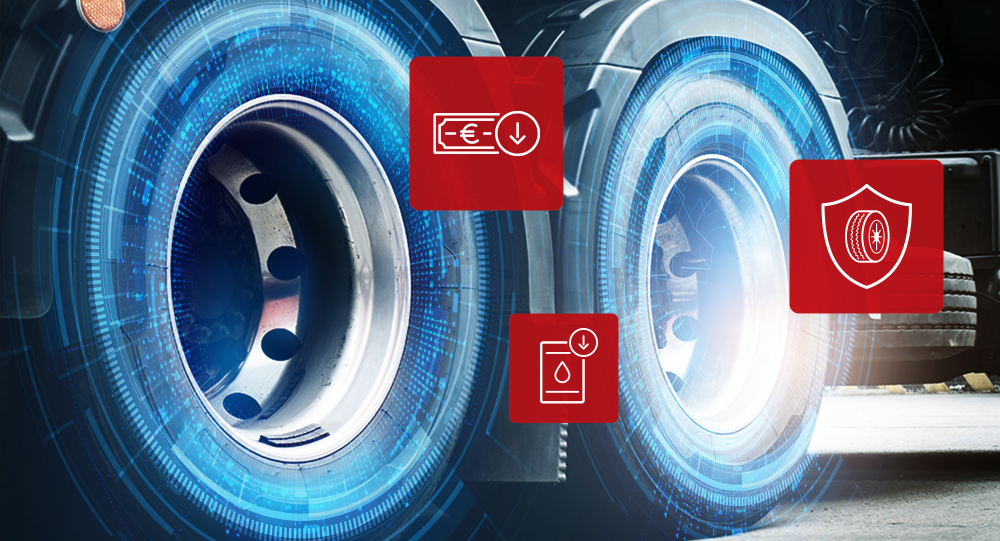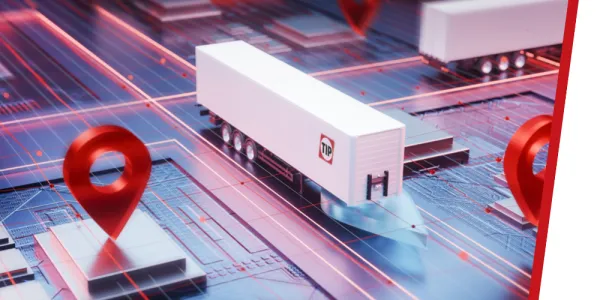The future of tyre safety: how Tyre Pressure Monitoring Systems (TPMS) are evolving
TPMS (Tyre Pressure Monitoring Systems) is a technological solution that enables drivers (and in the case of heavy goods vehicles, fleet teams) to monitor the air pressure of tyres. The system consists of sensors fitted to each tyre which transmit data to a vehicle’s dashboard and / or a fleet management system. The main purpose of TPMS is to warn drivers, including via their fleet teams, when tyre pressure is too low, thus avoiding unsafe driving conditions.
Using TPMS can also provide fuel efficiencies, whilst reducing the impact on the environment.
New regulations mandating the installation of TPMS on trailers has been and is being introduced, making it a hot topic in the transportation industry. This article aims to provide a quick guide to TPMS and its present challenges.
The need for TPMS: overcoming the dangers of low tyre pressure
TPMS was developed in response to the growing concern over tyre safety and the dangers of low tyre pressure. Without TPMS fitted, drivers rely solely on manual checks, which can be prone to error or those checks may simply not be done, leading to vehicles being driven with underinflated tyres, thus impacting both road safety and fuel efficiency.
Low tyre pressure can result in:
- Tyre failure (aka ‘blowouts’)
- Reduced road grip and increased risk of accidents
- Decreased fuel efficiency
- Longer stopping distances
- Increased wear and tear on tyres
- Premature replacement of tyres
- Increased maintenance
all of which have an adverse effect on an operator’s costs or safety on the roads.

TPMS: the basics
TPMS provides several benefits, such as improving fuel utilisation, extending tyre life and enhancing vehicle safety. However, it is not a substitute for regular tyre maintenance and manual tyre pressure checks.
Overcoming interoperability challenges in TPMS for trucks and trailers: the road ahead
Interoperability is currently a key challenge in the development of TPMS for trucks and trailers. Lack of standardisation among different sensors leads to compatibility issues, which can result in increased costs and safety risks for drivers. To address these challenges, solutions such as creating a universal, standardised system for all TPMS systems or developing a wireless communication protocol that allows all sensors to communicate with each other, regardless of the type of sensor being used, are being proposed.
Collaboration among players in the industry is key to implementing these solutions and ensuring greater safety, efficiency and cost savings. It is important to note that while TPMS technology is still developing, standardisation efforts are underway to overcome the interoperability challenge.
Never letting your guard down with TIP’s TyrePlus TPMS tyre sensor
Here at TIP, we understand how important it is to maintain correct tyre pressures and avoid incidents and major costs for fleet operators. That is why we offer TyrePlus, our own solution that detects slow punctures early and saves costs by reducing vehicle downtime and fuel consumption. By transmitting tyre data and alerts via a modem to the fleet management system, sole dependency on a driver’s actions is addressed and fleet teams can promptly respond effectively to enable safety and cost saving benefits.
TyrePlus is a tyre pressure monitoring solution for trailers that is designed to reduce fleet costs and improve vehicle safety. TyrePlus detects under/over-inflated tyres, provides temperature data for early leakage detection, reduces fuel costs, breakdowns, CO2 emissions and helps ensure trailers remain operational.
TyrePlus works with all types of trailers and continuously provides updates on tyre pressure and temperature via its internally mounted sensors. It delivers data to fleet teams to considerably enhance their fleet management function.
Click here for more information on TyrePlus and if you are interested in equipping your trailer fleet with it, please contact your usual TIP representative or branch or Contact Us.





